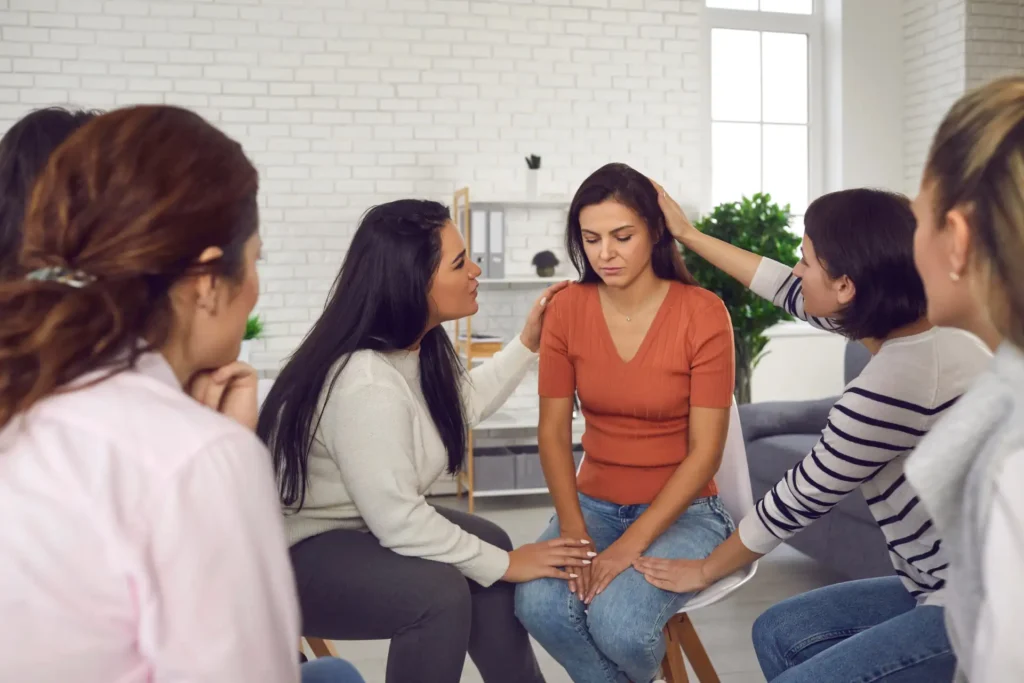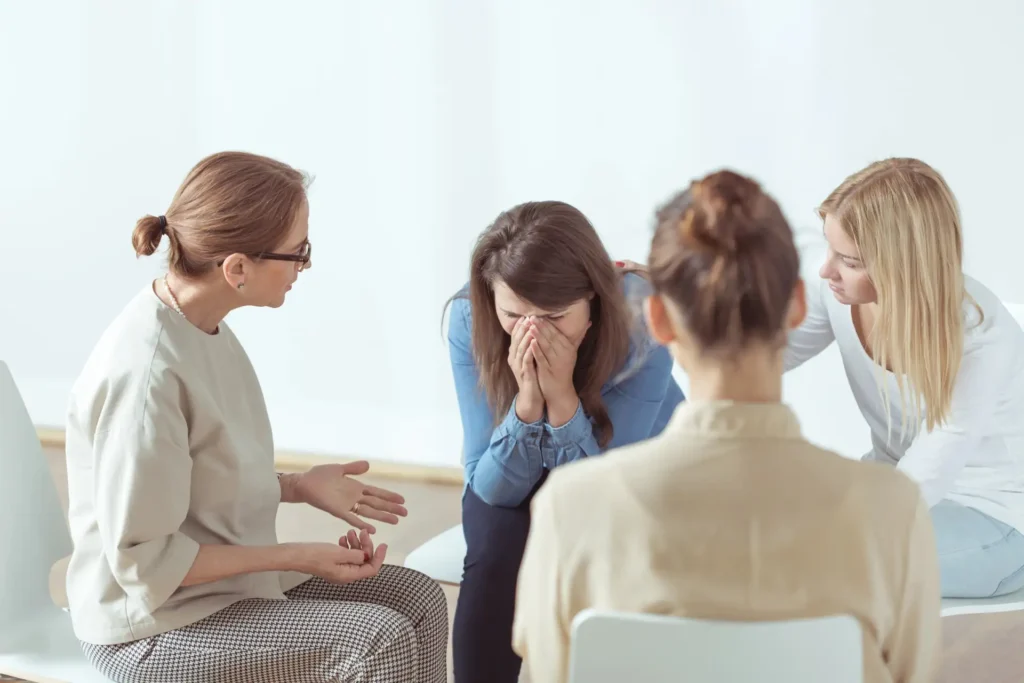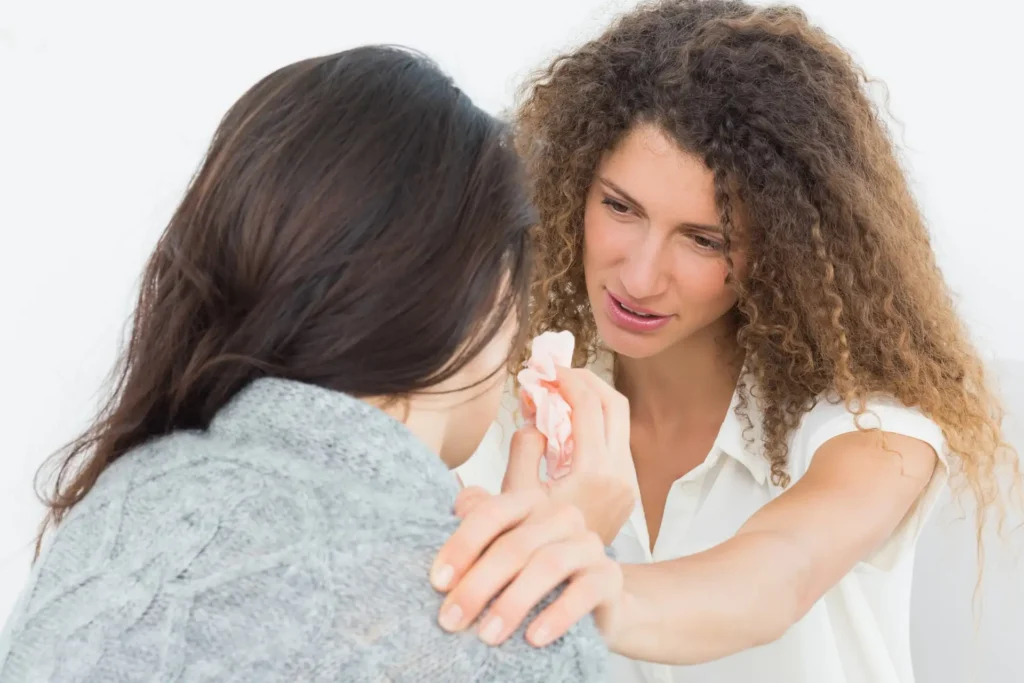In recent years, substance abuse treatment in Colorado Springs has evolved significantly, responding to the growing understanding of addiction as an interplay between biological, psychological, and social factors. According to the Colorado Department of Public Health and Environment, approximately 11% of Colorado Springs residents struggle with substance use disorders, a statistic that underscores the critical need for specialized treatment facilities. Women, in particular, face unique challenges in recovery, with research from the National Institute on Drug Abuse indicating that women progress from initial substance use to dependence more rapidly than men and experience different barriers to seeking treatment.
At The Rose House, we’ve observed a significant increase in women seeking gender-specific treatment options that address their unique recovery needs. Our clinical team recognizes that women often contend with co-occurring mental health disorders at higher rates than men, with depression and anxiety frequently accompanying substance use disorders. The Substance Abuse and Mental Health Services Administration (SAMHSA) reports that nearly 70% of women with substance use disorders have experienced trauma or abuse, highlighting the necessity for trauma-informed care approaches.
Women throughout the United States, including those from Colorado Springs, choose our specialized treatment program because we understand the distinct physiological, psychological, and social factors that influence women’s experiences with addiction. Our comprehensive addiction treatment approaches are designed specifically for women, creating a supportive environment where healing can occur among peers with similar experiences and challenges.
Understanding the Spectrum of Addiction Treatment in Colorado Springs

Colorado Springs residents seeking recovery face a wide array of treatment options, from alcohol rehab to intensive residential treatment. Our clinical experts have found that understanding this continuum of care is essential for women to make informed decisions about their recovery journey.
Medical Detox: The Critical First Step
For many women in active addiction, medical detox represents the beginning of their detox journey. This structured process allows individuals to safely withdraw from substances under professional medical supervision. While The Rose House doesn’t provide on-site medical detox, our admissions specialists work closely with trusted partners in Colorado Springs and surrounding areas to ensure seamless transitions into our programs following detoxification.
Medical support during detox is particularly important for women, as they may experience withdrawal symptoms differently than men. Our team has observed that women often report more intense psychological symptoms during withdrawal, necessitating specialized care that addresses both physical and emotional needs during this vulnerable time.
Residential Treatment: Immersive Healing
Residential treatment provides the structured, immersive environment many women need to begin meaningful recovery. At The Rose House, our residential facilities offer women a peaceful environment in a women only “recovery village” away from the triggers and stresses of daily life, allowing them to focus entirely on their healing process.
Our clinical team has developed a drug rehab and mental health residential program that combines evidence-based methods with holistic approaches, addressing the whole person rather than just the symptoms of addiction. This comprehensive approach is particularly valuable for women dealing with their mental health, as it allows for integrated services of both drug, alcohol addiction and mental health conditions.
Intensive Outpatient Programs: Flexible Recovery Support
Intensive outpatient programs provide a vital level of care for women who require substantial treatment support while maintaining some aspects of their daily responsibilities. These programs typically involve several hours of therapy multiple days per week, offering flexibility without sacrificing the quality care necessary for recovery.
At The Rose House, we’ve found that our intensive outpatient program serves as effective step-down option for women transitioning from residential treatment, as well as initial treatment options for those whose substance use disorders don’t require 24-hour care. Our approach in these programs emphasizes building recovery skills that can be immediately applied to real-world situations.
Outpatient Treatment: Sustained Recovery Support
Traditional outpatient treatment represents the least intensive level of formal care, typically involving one to three therapy sessions per week. Outpatient programs are instrumental in providing ongoing support as women reintegrate fully into their communities and daily lives.
Our outpatient treatment services focus on relapse prevention, continued mental health support, and building the community connections necessary for long-term recovery. This level of care is a big role in the full continuum of recovery, ensuring women have access to professional guidance as they navigate the challenges to overcome substance use and address their mental health issues.
The Rose House’s Treatment Philosophy and Methodologies

At The Rose House, our approach to substance abuse treatment centers on the understanding that women’s paths to recovery differ significantly from men’s. Our treatment programs incorporate several key methodologies that address the specific needs of women in recovery:
Gender-Specific Trauma-Informed Care
Our clinical team recognizes the profound impact trauma can have on substance use and mental health challenges. Studies from the National Center for PTSD indicate that up to 80% of women seeking treatment for substance use disorders report histories of sexual abuse or other traumatic experiences. This reality shapes every aspect of our treatment approach.
Through dialectical behavior therapy and other evidence-based programs, we help women process traumatic experiences in a safe, supportive environment. Our therapists are specially trained in recognizing how trauma manifests in addiction and mental health disorders, allowing for more effective and compassionate intervention.
Integrated Treatment for Co-Occurring Disorders
The intersection of addiction and mental health conditions requires specialized care. Our treatment programs address the full spectrum of behavioral health needs, recognizing that substance use often develops as an attempt to manage underlying mental health issues.
We’ve observed that women with co-occurring disorders show significantly better outcomes when both conditions are treated simultaneously rather than sequentially. This integrated approach addresses depression, anxiety, PTSD, and other mental health conditions alongside substance use, creating a more comprehensive healing experience.
Family Involvement and Relational Healing
Relationships play a central role in women’s experiences of both addiction and recovery. Our family involvement programs recognize the importance of healing relational dynamics damaged by addiction while building healthy support systems for ongoing recovery.
Through family therapy, education, and support groups, we help women and their loved ones understand the nature of addiction, develop healthy communication patterns, and establish appropriate boundaries. This relational focus is particularly important for mothers, partners, and other women whose recovery is deeply intertwined with their roles in family systems.
Holistic Wellness Approaches
Recovery extends beyond abstinence from substances to encompass overall wellbeing. Our treatment programs include adventure therapy, nutritional guidance, fitness activities, and mindfulness practices that support physical, emotional, and spiritual healing.
These holistic approaches complement our evidence-based therapies, helping women develop sustainable self-care practices that support their recovery long after they complete formal treatment. By addressing the whole person, we help women build resilience against relapse and create fulfilling lives in recovery.
Program Options and Their Benefits at The Rose House

Our treatment programs offer women multiple pathways to recovery, each designed to meet different needs and circumstances:
Comprehensive Residential Program
Our residential treatment program provides women with an immersive recovery experience in a supportive, women-only environment. This program includes:
- Individual therapy sessions with licensed clinicians specializing in women’s recovery
- Daily group therapy addressing addiction, trauma, and mental health
- Experiential therapies including art therapy and adventure therapy
- Life skills development and relapse prevention planning
- Medication assisted treatment when clinically appropriate
The benefits of our residential program include reduced exposure to triggers, 24/7 support from understanding staff, and the opportunity to focus entirely on recovery without outside distractions. Our treatment experts have found that this intensive level of care is particularly beneficial for women with severe substance use disorders, significant mental health challenges, or unstable living situations.
Partial Hospitalization Program
Our partial hospitalization program offers a structured treatment experience while allowing women to return home in the evenings. This program serves as either a step-down from residential care or an entry point for women who need intensive treatment but cannot commit to residential care. Benefits include:
- Intensive therapeutic support five to seven days per week
- Continued access to our full range of treatment modalities
- Opportunity to practice recovery skills in real-world settings
- Maintenance of family connections during treatment
- Smoother transition to independent recovery
Intensive Outpatient Program
Our intensive outpatient program provides substantial support while allowing women to maintain work, education, or family responsibilities. This program typically involves 9-12 hours of treatment per week, offering:
- Flexible scheduling to accommodate work and family obligations
- Continued individual and group therapy
- Focus on applying recovery skills to daily life challenges
- Community support development
- Extended case management services
Continuing Care and Recovery Support
Long-term recovery extends far beyond formal treatment. Our continuing care programs provide ongoing support through:
- Regular check-ins with treatment team members
- Alumni support groups and community events
- Recovery coaching and mentorship opportunities
- Referrals to community resources and recovery groups
- Refresher workshops and skill-building opportunities
What Makes The Rose House Different
For women needing help that live in and around in Colorado Springs and beyond, several factors distinguish The Rose House’s approach:
Women-Focused Expertise
Our exclusive focus on women’s recovery allows us to develop specialized expertise that broader programs cannot match. Every aspect of our facility, programming, and staff training is designed with women’s unique needs in mind.
Our clinical team has extensive experience in addressing the specific challenges women face in recovery, including hormonal influences on substance use, societal expectations and stigma, childcare concerns, and relationship dynamics. This specialized knowledge translates into more effective, targeted treatment approaches.
Truly Integrated Dual Diagnosis Treatment
While many treatment programs claim to address co-occurring disorders, our approach to dual diagnosis treatment goes beyond basic screenings and medication management. Our treatment experts are dually trained in addiction medicine and mental health treatment, allowing for truly integrated care.
We’ve observed that this comprehensive approach leads to better outcomes for women with complex presentations, as it addresses the underlying mental health conditions that often drive substance use while simultaneously providing the structure and support needed for addiction recovery.
Extended Support Timeline
Recovery doesn’t end after 30 or 60 days of treatment. Our programs recognize the chronic nature of addiction and provide extended support timelines that match the reality of the recovery process. From our longer residential stays to our robust continuing care options, we ensure women have access to appropriate support throughout their recovery journey.
This extended support includes graduated levels of care, allowing women to step down gradually as they build confidence and stability in their recovery. Our alumni program further extends this support network, creating lifelong connections to recovery resources.
Emphasis on Sustainable Life Skills
Abstinence alone doesn’t constitute recovery. Our programs emphasize the development of practical life skills that support sustainable, fulfilling sobriety. From financial management and career development to relationship skills and healthy coping mechanisms, we help women build the foundation for long-term success.
Our case management team works with each woman to identify specific life skills needs and connects them with appropriate resources and learning opportunities. This practical focus ensures that women leave treatment with the tools they need to navigate life’s challenges without returning to substance use.
Common Treatment Challenges and How The Rose House Helps

Women seeking substance abuse treatment often face specific barriers and challenges. Our approach directly addresses these obstacles:
Childcare and Family Responsibilities
Many women delay seeking treatment due to concerns about childcare and family responsibilities. While we do not offer on-site childcare, our admissions specialists work closely with women to develop family care plans that allow them to access the treatment they need.
This support includes connecting women with temporary childcare resources, helping negotiate family leave from work, and facilitating family therapy to address role transitions during treatment. By proactively addressing these practical concerns, we remove significant barriers to women accessing care.
Trauma and Safety Concerns
Women with histories of trauma, particularly those involving male perpetrators, often feel unsafe in mixed-gender treatment settings. Our women-only environment provides a crucial sense of safety that allows for deeper healing work.
Our welcoming environment is intentionally designed to promote physical and emotional safety, with appropriate privacy, security measures, and trauma-informed staff interactions. This attention to safety needs allows women to fully engage in the vulnerability required for effective treatment.
Financial and Insurance Obstacles
Concerns about rehab costs represent a significant barrier for many women. Our admissions team works diligently to maximize insurance coverage, identify financial assistance options, and develop payment plans that make treatment accessible.
We accept most major insurance plans and provide transparent information about costs, coverage, and financial options. This straightforward approach helps women make informed decisions about their treatment without unnecessary financial stress.
Stigma and Shame
Women often face heightened stigma related to substance use, particularly mothers and professionals. Our treatment programs directly address the shame and guilt that frequently accompany women’s experiences of addiction.
Through specialized group therapy, individual counseling, and psychoeducation, we help women understand addiction as a health condition rather than a moral failing. This shift in perspective is often transformative, allowing women to move forward in recovery without the burden of excessive shame.
Results and Outcomes at The Rose House
Our commitment to quality care is reflected in our treatment outcomes and the experiences of women who complete our programs. While individual results vary, our program demonstrates several consistent benefits:
Reduced Relapse Rates
Women who complete our full continuum of care show significantly lower relapse rates compared to national averages. Our focus on comprehensive healing—addressing trauma, mental health, and practical life challenges alongside substance use—contributes to this sustained recovery success.
Improved Mental Health Outcomes
Our integrated approach to co-occurring disorders results in measurable improvements in mental health symptoms. Women completing our programs typically report reduced anxiety and depression, improved emotional regulation, and better stress management skills.
Enhanced Quality of Life
Beyond abstinence, women who complete our programs report substantial improvements in overall life satisfaction. These improvements span relationships, employment, physical health, and spiritual wellbeing, reflecting our whole-person approach to recovery.
Strengthened Support Networks
Our emphasis on family involvement and community connection helps women build robust support systems that extend well beyond formal treatment. These networks provide crucial emotional support and practical assistance throughout the ongoing recovery journey.
Summary
Drug addiction and alcohol rehab in Colorado Springs and beyond continues to evolve, with specialized programs recognizing the unique needs of different populations. At The Rose House, our exclusive focus on women’s recovery allows us to provide truly tailored experience that addresses the biological, psychological, and social factors that influence women’s experiences with addiction and recovery.
Our comprehensive approach integrates evidence-based treatment for both substance use and mental health disorders, creates a safe and supportive environment for trauma healing, and emphasizes the practical life skills necessary for sustainable recovery. By addressing each women—not just the symptoms of addiction—we help women build the foundation for lasting health and wellbeing.
For women from Colorado Springs and across the country seeking specialized substance abuse treatment, The Rose House offers a unique combination of clinical excellence, gender-specific expertise, and compassionate care. Our programs recognize both the challenges women face in recovery and the remarkable strength they bring to the healing process.
Begin Your Recovery Journey Today
Taking the first step toward recovery requires courage, and at The Rose House, we honor the strength it takes to reach out for help. Our admissions process begins with a confidential conversation about your unique situation, treatment needs, and goals for recovery. Our experienced admissions specialists will guide you through insurance verification, explain our program options, and answer any questions you have about our approach to women’s treatment.
Colorado Springs residents and women throughout the country choose The Rose House because of our specialized focus on women’s recovery needs and our comprehensive approach to healing. We invite you to contact us today to learn more about how our programs can support your journey toward a healthier future free from the constraints of addiction and mental health challenges.
Frequently Asked Questions
Women’s substance abuse treatment addresses several gender-specific factors that influence addiction and recovery. Our clinical team recognizes that women often develop substance use disorders more quickly than men despite using smaller amounts (known as telescoping), frequently use substances to cope with trauma or mental health issues, and face unique social stigma and barriers to treatment. Women-specific programs like ours at The Rose House provide treatment that addresses hormonal influences on cravings and withdrawal, offers trauma-informed care for the high rates of sexual abuse and domestic violence among women with substance use disorders, and creates safe spaces where women can discuss gender-specific concerns like pregnancy, motherhood, and relationship patterns. This specialized approach leads to better outcomes for women by addressing the full context of their addiction experience rather than applying a one-size-fits-all model.
At The Rose House, our comprehensive addiction treatment programs address a wide spectrum of substance use disorders. We provide specialized care for alcohol addiction, offering evidence-based approaches that address both the physical and psychological aspects of alcohol dependence. Our drug rehab services encompass treatment for opioid addiction, including prescription painkillers and heroin, with medication assisted treatment available when clinically appropriate. We also treat stimulant use disorders (cocaine, methamphetamine, prescription stimulants), sedative dependencies (benzodiazepines, sleeping medications), and marijuana use disorders. Our treatment approach recognizes that many women struggle with polysubstance use, and our clinical team is experienced in addressing complex patterns of substance use alongside co-occurring mental health disorders. Each woman receives a personalized treatment plan that addresses her specific substance use patterns and underlying factors driving her addiction.
Yes, The Rose House accepts most major insurance plans for substance abuse treatment and mental health services. Our admissions specialists work directly with insurance providers to verify benefits, explain coverage details, and maximize the treatment services covered under each plan. We understand that navigating insurance coverage for behavioral health services can be challenging, so our team handles much of this process for prospective clients. For women whose insurance provides partial coverage or who lack insurance entirely, we offer several payment options and can provide guidance on financing alternatives. We believe financial concerns should never prevent women from accessing the care they need, and we work diligently to find solutions that make our treatment programs accessible. We recommend contacting our admissions team directly for specific information about your insurance coverage and financial options.
Treatment duration at The Rose House varies based on individual needs, clinical recommendations, and the specific programs utilized. Our residential treatment typically ranges from 30 to 90 days, with many women benefiting from longer stays that allow for deeper healing work. Our partial hospitalization program usually spans 2-4 weeks, while our intensive outpatient programs generally last 8-12 weeks with decreasing intensity over time. Our treatment experts emphasize that addiction recovery is a process rather than an event, and research consistently shows that longer treatment engagement correlates with better outcomes. Many women progress through multiple levels of care in our full continuum, which might mean a total treatment journey of 3-6 months or longer. Throughout the admissions process, we work with each woman to develop a treatment timeline that balances clinical recommendations with practical considerations like insurance coverage, family needs, and work obligations.
The Rose House provides truly integrated treatment for co-occurring disorders, addressing substance use and mental health challenges simultaneously rather than as separate issues. Our clinical team includes specialists in both addiction medicine and mental health treatment who work collaboratively to develop comprehensive treatment plans. We conduct thorough assessments to identify specific mental health conditions such as depression, anxiety, PTSD, bipolar disorder, and eating disorders that may accompany substance use disorders. Our treatment approach includes evidence-based psychotherapies like cognitive behavioral therapy and dialectical behavior therapy, appropriate psychiatric medication management when indicated, trauma-specific interventions, and holistic approaches that support overall mental wellbeing. This integrated approach is essential because untreated mental health conditions often lead to relapse, while active substance use can exacerbate mental health symptoms. By addressing both simultaneously, we help women break the cycle of self-medication and develop healthier coping strategies.
Family involvement forms a crucial component of effective treatment at The Rose House. We offer several support options for families of women in our programs, including regular family therapy sessions (in-person or virtual) that address communication patterns, boundary-setting, and healing relationship dynamics damaged by addiction. Our family education programs help loved ones understand the nature of addiction as a chronic health condition, recognize enabling behaviors, and learn how to support recovery without sacrificing their own wellbeing. We provide resources and referrals for family members’ own support needs, including connections to groups like Al-Anon, SMART Recovery Family & Friends, and family-focused therapy options. Our treatment team maintains appropriate communication with designated family members throughout the treatment process (with client consent), and we offer continuing support for families during the transition back home. This comprehensive family approach recognizes that addiction affects the entire family system and that healing these relationships significantly improves long-term recovery outcomes.
Recovery continues long after formal treatment ends, and our discharge planning begins early to ensure a smooth transition to ongoing recovery support. Each woman leaves The Rose House with a comprehensive continuing care plan that includes recommendations for ongoing therapy, recovery group participation, medication management if applicable, and strategies for managing potential triggers and challenges. Our alumni program provides continued connection through regular support groups, social events, service opportunities, and check-in calls from staff. We facilitate connections to community resources near Colorado Springs and other home communities, including outpatient treatment providers, sober living options when needed, recovery community organizations, and peer support groups. Many women maintain long-term relationships with their Rose House peers, creating natural support networks that understand the unique challenges of women’s recovery. Our door always remains open for refresher sessions, additional support during difficult times, or celebration of recovery milestones. This continuing care approach recognizes recovery as a lifelong journey that extends far beyond formal treatment.
Sources:
https://coag.gov/app/uploads/2024/01/SATF-Annual-Report-2024.pdf
https://library.samhsa.gov/sites/default/files/pep20-06-04-002.pdf







